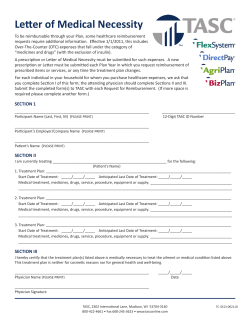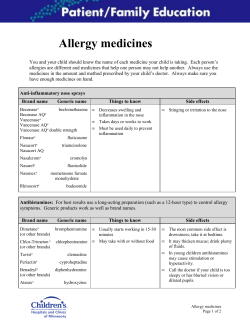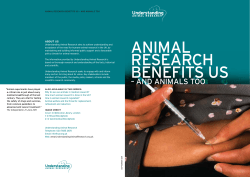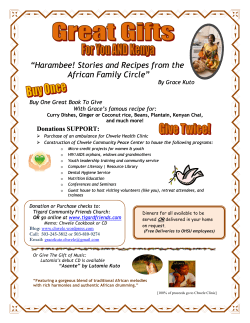
AFRICAN MEDICINES REGULATORY HARMONISATION PROGRAMME African Regional Medicines Registration
AMRH AFRICAN MEDICINES REGULATORY HARMONISATION PROGRAMME IN THIS ISSUE NEWSLETTER ISSUE 10 African Regional Medicines Registration Harmonisation mid-year update • African Regional Medicines Registration Harmonisation mid-year update. • Bridging medicines legislation gaps in Africa. • The 1st Biennial Scientific Conference on African Regulatory, 2-3 December, 2013, Johannesburg , South Africa • Joint African Drug Regulatory Authorities and Eastern Mediterranean Drug Regulatory Authorities Conference, 4-6 December, Johannesburg, South Africa • Regulatory Capacity Development in Africa • Upcoming Events Across Africa, medicines regulatory harmonisation continues to rise higher on national and regional agendas with significant progress being made by the East African Community (EAC), West African Health Organisation (WAHO) and West African Economic and Monetary Union (UEMOA) since the beginning of 2013.Continued technical, political and financial support provided by NEPAD Agency, World Health Organisation (WHO) and the World Bank was instrumental in the success of the regional medicines registration harmonisation projects. It is evident that through partnerships, African citizens will reap the benefits of the African Medicines Regulatory Harmonisation (AMRH) Initiative. Dr. Ibrahim Mayaki, CEO of NEPAD Planning and Coordinating Agency said during his official visit to Tanzania Food and Drugs Regulatory Authority (TFDA) in March 2013 that “African governments and regulatory authorities need to work together using joint approaches”. Regional Economic Communities (RECs) update EAC made important strides towards advancing the harmonisation agenda by establishing2 regulatory initiatives, namely: Medicines Registration Harmonisation (MRH) project which was launched in March 2012 and an initiative on Regional Harmonisation of Regulation of Medical Devices and Medical Diagnostics in the EAC Partner States. They’ve established four (4) Technical Working Groups (TWGs) on Medicines Evaluation and Registration, Good Manufacturing Practice, Quality Management System and Information Management System. development and implementation of agreed common information management system and quality management systems (QMS) requirements for regulation of medicines & ISO certification amongst other things. ISSUE 10 Page 2 African Regional Medicines Registration Harmonisation mid-year update (cont.) The 3rd EAC-MRH Project Steering Committee will convene in Bujumbura, Burundi from 2-3 September 2013 to discuss the MRH implementation progress report; final guidelines developed by the four 4TWGs; the development of EAC Regional Pharmaceutical Policy, Regulatory Framework and a Bill for Establishment of EAC Medicines & Food Safety Commission; and the initiatives for National & Regional Capacity Building for Medicines Regulation. ponents of the medicines registration proposals and have expressed their willingness to collaborate in order to avoid duplication of efforts by their member states. They’ve agreed that UEMOA will continue working with8 Francophone countries, namely Benin, Burkina Faso, Guinea-Bissau, Ivory Coast, Mali, Niger, Senegal and Togo while WAHO works with the remaining 7 Anglophone and Lusophone countries which are Cape Verde, Gambia, Ghana, Guinea, Liberia, Nigeria and Sierra Leone. A major milestone was reached in the West Africa region with the establishment of the Medicines Registration Harmonisation (MRH) Steering Committee and Technical Working Groups at a workshop convened from 22-23 May in Accra, Ghana by WAHO. Further, the draft terms of reference and compositions of Expert Committees were developed, which will pave way to faster imThroughout the African Medicines Regulatory Harmonisation plementation of the AMRH (AMRH) Initiative implementation across the region integrating all period, it has been learned that key stakeholders. These comthough the MRH project develmittees are in the area of: opment phase takes longer than i) Medicines Dossier Evaluation anticipated in some instances, and Registration; ii) Quality Mansome implementation steps can agement Systems and Quality be taken even before the reControl; iii) Information Managegional MRH Projects are offiment System; iv) GMP and Incially launched. West Africa is a spections; and v) Capacity Buildtestimony to this fact because ing and Legislation. With WAHO and UEMOA have UEMOA as a member of WAHO started implementing some com- MRH Steering Committee, ex- change of information, implementation progress and lessons learnt between these two organisation will surely benefit all Economic Community of West African States (ECOWAS) member states. Although Central and Southern regions are progressing relatively slow, plans are underway to revive dialogue between NEPAD Agency and Southern African Development Community (SADC) Secretariat in the next quarter in order to finalize their MRH project proposal which was developed in 2011. Industry Engagement Industry also played an important role in the progress made in East and West Africa. At the Assembly of ECOWAS Ministers of Health on 5th April, 2013 in Praia, Cape Verde, Ministers signed a charter for collaboration between WAHO and pharmaceutical industry which recognizes regional harmonisation as a critical factor for success. Industry stakeholders in the EAC region convened a meeting of the Federation of East African Pharmaceutical Manufacturers (FEAPM) and the EAC-RMPOA (Regional Pharmaceutical Manufacturing Plan of Action) Steering Committee in Nairobi where AMRH Partners successfully galvanized stakeholder relations through information sharing ISSUE 10 Page 3 sessions and discussion on the Manufacturers (FEAPM) form progress of the EAC MRH in the part of the AMRH Advisory Comregion. mittee which is the governing body of the AMRH Initiative. In recognition of the importance of industry engagement, AMRH Advisory Committee The AMRH Advisory Committee Federation of African Pharmaheld their annual meeting on the ceutical Manufacturing Associa- 8th of June 2013 in Nairobi, tions (FAPMA), West African Kenya to note the draft AMRH Pharmaceutical Manufacturers monitoring and evaluation (M&E) Association (WAPMA), Southern framework and AMRH ImpleAfrican Generic Medicines Asso- mentation Tool Kit developed by ciation (SAGMA) and Federation NEPAD Agency for consultation of East African Pharmaceutical and validation by stakeholders; it endorsed Regional Economic Communities (RECs) implementation reports and the establishment of Pan-African Harmonisation Working Party for Medical Devices and Diagnostics. The TWG on Regulatory Capacity Development and TWG on Medicines, Policy and Regulatory Reforms presented their progress reports for adoption . AMRH Advisory Committee meeting held on 8 June 2013 Nairobi-Kenya Bridging medicines legislation gaps in Africa The lack of comprehensive medicines legislation in many countries in Africa remains a challenge and while some countries have legislation in line with the core elements as recommended by the World Health Organisation (WHO), others do not have medicines regulatory laws in place. NEPAD Agency and Pan African Parliament have joined forces to support the medicines regulatory harmonisation in Africa, through the development of a Medicines Regulations Model Law that will assist RECs and/or countries in to review their national laws and subsequent harmonisation of national laws with regional policies, protocols and treaties. ISSUE10 Page 4 Technical Working Group on Medicines Policy and Regulatory Reforms meeting held on ...in Nairobi, Kenya A Technical Working Group (TWG) on Policy and Regulatory Reforms has therefore been constituted comprising a core team of regulatory, policy and legal experts that provides technical support and advice on issues of policy and legislation to the Advisory Committee of the African Medicines Regulatory Harmonisation (AMRH) initiative. The TWG provides backstopping technical support on on-going policy and legal activities within the AMRH towards achieving the effective regulation of medicines and medical products. The TWG therefore supports countries and RECs in their endeavor to review and/or develop policies and legislation on medicines and medical products for facilitating effective regulation The TWG whose membership comprises African Union Com- mission (AUC), Pan-African Parliament (PAP), NEPAD Agency, World Health Organisation (WHO): WHO-HQ, WHO-AFRO, WHO-EMRO, UNAIDS, Federation of African Manufacturers and Regional Economic Communities (RECs) convened its inaugural meeting from 6th to 7th June 2013 in Nairobi Kenya. The main objective of the meeting was to validate the draft model law in preparation for a presentation to PAP and thereafter regional and national consultations. on the model law. As a way forward the committee agreed on an action plan aimed at addressing some of the policy and legal issues identified during the meeting. Two key delivery areas were agreed upon including i) Model Law finalization for endorsement by the AU Policy Organs and adoption by the Summit; and ii) Model Law implementation arrangements by regional economic communities and member The meeting achieved the follow- states. Two sub-committees were estabing outputs: 1) The TWG agreed on the final lished that will specifically focus on tackling each of the identified TOR prior to submission to delivery areas. The subthe Advisory Committee. 2) Policy issues were identified committees will report on their progress to plenary meetings of and an action plan for addressing them was outlined. the TWG. 3) The TWG discussed and made detailed comments ISSUE 10 Page 5 Announcing the 1st Biennial Scientific Conference on African Regulatory, 2-3 December, 2013, Johannesburg The NEPAD Agency in collaboration with the World Health Organisation (WHO) and the organisational support of US-Food and Drugs Administration (USFDA) and the Drugs for Neglected Diseases initiative (DNDi) is pleased to announce the First Biennial Scientific Conference on Medicines Regulation in Africa, to take place on 2 and 3 December 2013, at Birchwood Hotel, Johannesburg, South Africa. The theme of the conference is “Building Partnerships for Sustainable Capacity Development in Medicines Regulation in Africa”. The initiative to organise this conference is borne of the necessity for African regulatory authorities, researchers, academic institutions and industry to work together to address some of the salient issues affecting their areas of delivery of medical products and technologies to the public. It is undisputable fact that most of the African pharmaceutical markets are poorly regulated which consequently puts public health at risk and erodes public confidence on health care delivery systems and specifically on the quality and safety of medicines they use. In recognition of this problem, various Governments and partners have embarked on regulatory capacity building programmes albeit in uncoordinated fashion. In addition, various Regional Economic Communities (RECs) in Africa have embarked on medicines regulation harmonisation initia- tives with a view to increase patients’ access to quality, safe and efficacious essential medicines through capacity building programmes and streamlining regulatory processes and procedures. The goal of the conference is to enable policy makers, regulators, industry, academia, research organisations and scientists to network and exchange information on innovative approaches for pharmaceutical sector development in Africa. In addition, an exhibition by pharmaceutical industry and other stakeholders will also be held on the sidelines of the conference. Conference Programme A range of pertinent issues will be discussed at the conference. Session to be include: Session II: Global Regulatory Environment: Where is Africa? Session III: Panel Discussion on Regulatory oversight on clinical trials in Africa: Where are we? Conference Registration: Session IV: Panel discussion on situation analysis and legal background for medicines policies and regulatory reforms in Africa Session V: Regulatory Capacity Development & Partnerships Session VI: Panel discussion on substandard & falsified medicines: what is Africa doing to combat the menace? Session VII (Parallel): Strengthening Pharmacovigilance Systems in Africa Session VIII (Parallel): Providing an enabling environment for pharmaceutical production in Africa For a full programme please visit: www.amrh.org Conference registration Registration fee is $50p.p or R450 p.p and free of charge for speakers and invited guests. For more details on payment for registration and exhibitions please email: nthabiseng@nepadst.org ISSUE 10 Page 6 Joint African Drug Regulatory Authorities and Eastern Mediterranean Drug Regulatory Authorities Conference, 4-6 December, Johannesburg, South Africa Following the Biennial Scientific conference the WHO Regional Office for Africa (WHO-AFRO) and WHO Regional Office for the Eastern Mediterranean (WHO-EMRO) will co-host the 3rd African Medicines Regulatory Authorities Conference in collaboration with NEPAD Agency which will also be held in Birchwood Hotel, Johannesburg on 4-6 December 2013. While the first two African Medicines Regulatory Authorities Conference brought together regulators from sub-Sahara Africa, the third conference is intended to bring together regulators from sub-Saharan Africa as well as North Africa. For more information please visit: www.afro.who.int and www.amrh.org Regulatory Capacity Development in Africa A Technical Working Group (TWG) on Regulatory Capacity Development was established by NEPAD Planning and Coordinating Agency in 2012 and thus far has done a lot of work to lay out a foundation and roadmap for the medicines regulatory capacity development in Africa. It is clear that effective regulatory capacity development efforts should target National Medicines Regulatory Authorities (NMRAs), government, Regional Economic Communities (RECs), local research institutions, academia and the private sector with a goal toward enhancing the short and long term potential for these institutions to support governments to lead and manage regulatory systems in their countries. The approach of the TWG has been to promote practical approaches that have the potential to transform the environment that will foster sustainable regulatory capacity building activities Regional Centres of Regulatory Excellence (RCOREs) in Africa; and v) Discuss preparations for the 1stScientific Conference on Medicines Regulation in Africa to be held in Johannesburg, South Africa from 2-3 December 2013 and the 3rd African Medicines Regulatory Authorities Conference from 4-6 December 2013 The second TWG meeting was held on 6 June 2013 in Nairobi Kenya. The main objective of the meeting was to review on-going TWG activities and to discuss and endorse several new and revised draft documents. Specific objectives were to: i) Review of on-going activities and the roadmap for regulatory capacity development in Africa; ii) Review approaches for harmonizing regulatory science curricula in Africa; iii) Approve the revised TOR for the TWG Regulatory Capacity Development; iv) Review progress on establishing The TWG activities are geared towards developing the necessary environment that will increase regulatory workforce in Africa through human resource and institutional capacity strengthening. This will ultimately lead to improved competencies and efficiencies of individual regulators and the NMRAs. Consistent and sustained performance by individual regulatory affairs professionals and the regulatory system over a period of time will lead to effective regulation of medical products and technologies thereby contributing to socio-economic development agenda for the African continent. The TWG thus provides technical advice on the development and implementation of sustainable medicines regulatory capacity development programmes in Africa in collaboration with partners, research and academic institutions in support of the AMRH mission. Key deliverables of the TWG include; the establishing Regional Centres of Regulatory Excellence in Africa using the existing institutions on the continent, It is envisaged that at least each regional economic community will have one RCORE. other things, as an interdisciplinary and multidisciplinary area of specialty, the experts will continue to play an evolving role in the development of new tools, approaches and standards for the assessment of quality, safety, efficacy and performance of health products and technologies. member states and AMRH Programme partners; iii) Be available to carry out assignments in the African continent for the AU/NEPAD Agency; Members of the Pool of Regulatory Experts will specifically: i) Provide technical assistance on the development and implementation of sustainable medicines regulatory capacity building A pool of regulatory experts will programmes in collaboration with also be established and will con- partners and academic institutions in support of the AMRH obstitute a significant resource for the development of the pharma- jectives; ceutical sector in Africa in ii) Carry out technical assistance particular and promotion of public missions in response to specific health in general. While the pool requests from African Union will support the RCOREs among iv) Share current expertise, information, best practices in their fields of expertise when called upon. UPCOMING EVENTS SEPTEMBER • Regional Project Steering Committee, 2-3 September, 2013, Bujumbura, Burundi • Conference on International IVD Medical Devices Regulations, from 16-18 September, Taipei, Taiwan • EAC Partner States National stakeholders Consultation meetings, from 16 Sept – 03 October 2013, Uganda, Burundi, Rwanda, Tanzania and Kenya • Africa Pharma Summit, from 23-24 September, Hammamet, Tunisia • SCMS Vendor Meeting, from 25-27 September, Johannesburg, RSA OCTOBER • ANDI Stakeholders Meeting, from 1-3 October, Nairobi, Kenya • 2nd African high-level representatives meeting on the second European and Developing Countries Clinical Trials Partnership programme (EDCTP2), on 21 October, Dakar, Senegal • Workshop on “Ensuring Successful Implementation of Harmonised Medicines Regulation in the East African Community from 24-26 October, Nairobi, Kenya Calling for your valued Opinions and Feedback… In order to further address your interests and preferences for an information-sharing tool, we are requesting that you kindly send us your feedback by filling in a brief one page survey attached to the newsletter. Please send responses to amrh@nepad.org or download a copy from the website homepage at www.amrh.org. We look forward to your thoughts. AMRH CONTACTS AMRH WHO - AFRO Tel: (office) +27 841 4979/3294/2833 Dr Jean-Baptiste Nikiema Regional Advisor, Essential Medicines, Health Systems Services. Tel: +242 050403726 Email: nikiemaj@afro.who.int Email: amrh@nepad.org NEPAD Agency Prof. Aggrey Ambali Advisor NSTIH Tel (office): +27-12-841-3688 Email: Aggrey@nepadst.org Dr. Ossy MJ Kasilo Coordinator, Essential Medicines and Health Technologies Regional Advisor for Traditional Medicine Health Systems and Services Cluster, Tel: +242 055 384 162 Email: kasiloo@who.int Mrs. Margareth Ndomondo-Sigonda AMRH Programme Coordinator Tel (office): +27-12-841-2980 Email: Mnsigonda@nepadst.org World Bank BMGF Dr. Vincent Ahonkhai Senior Regulatory Officer Tel (office): +1-206-709-3715 Email: vincent.ahonkhai@gatesfoundation.org WHO - Geneva Dr Samvel Azatyan Manager, Medicines Regulatory Support Programme, Quality Assurance and Safety: Essential Medicines and Pharmaceutical Policies Tel: (office) +41-22-791-3528 Email: azatyans@who.int WHO - EMRO Dr. Mohamed BIN SHAHNA Regional Advisor Essential Medicines Tel (office): +202-227-65561 Email: binshahnam@emro.who.int Dr. Ramana NV Gandham Lead Health Specialist, Africa Region Tel: (office) +254-20-3226376 Gramana@worldbank.org Dr. Andreas Seiter Senior Health Specialist - Pharmaceuticals Health, Nutrition and Population Tel: (office) Tel +1-202-473-3629 Email: aseiter@worldbank.org DFID Mr. Celestine Kumire SARPAM Programme Director Tel: +27 11 880 60993/4 Email: Celestine@sarpam.net Mr. Joseph Mthetwa Senior Programme Officer for Health and Pharmaceuticals, SADC Secretariat Email: jmthetwa@sadc.int Tel: + 267 35 1863 UNAIDS Dr. Abdoul Dieng, Chief, Policy Coordination, Office of the Deputy Executive Director Tel: (Office) +41227914750 Email: dienga@unaids.org Dr. Eduard Beck Senior Technical Advisor, Office of the Deputy Executive Director, Programme Branch, Tel: (Office) + 41 22 791 5521 Email: Becke@unaids.org Dr. Jean-Elie Malkin Senior advisor to the Executive Director, Tel. (Office) : +41227914714 Email:Malkinj@unaids.org Mr. Appollo Muhairwe Operations Officer Tel: +256414032409/414230094 Email: amuhairwe@worldbank.org CHAI Kathryn Boateng Consultant Pharmaceuticals, Health, Nutrition and Population Email: kboateng@worldbank.org Ms. Meredith C Moore Country Support Manager, Drug Access Team Tel: (Office) +1 617 784 5198 Email: mmoore@clintonhealthaccess.org MORE INFORMATION ON THE AMRH PROGRAMME For more information on the AMRH processes; Frequently Asked Questions on AMRH; Participating RECs; AMRH useful links; Older editions of the AMRH Programme News Letter; AMRH summary status and future plans; REC Project status, please visit the AMRH website: www.amrh.org. The French website will be up and running very soon! © copyright. All rights reserved. This newsletter may be freely quoted and translated in part or in full provided authorization is received from the AMRH . Credit must be given to the AMRH if the newsletter is quoted in part or in full.
© Copyright 2025










